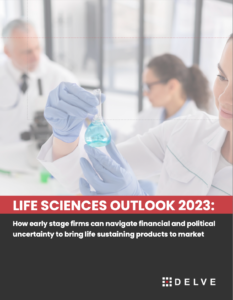What Goes Up, Must Come Under Scrutiny
Here’s What You Need To Know
After being thrust into the limelight during the pandemic, it is not surprising that life sciences firms – particularly the innovative early-stage firms advancing new cures, treatments, diagnostics, and other health technology – experienced banner years for investment in 2020 and 2021. As the cost of capital spiked with interest rates last year even as the public markets crashed, life sciences firms and their investors find themselves in a very different environment in 2023, and the challenges they face offer lessons and insights for a range of industries.
With investors more hesitant to deploy funding and life sciences exits declining in frequency and volume, early-stage biotechnology and biopharmaceutical firms that raised initial funding in the heyday of 2020 and 2021 face a funding cliff. Adding further pressure, Washington is waking up to just how expensive increasingly customized and sophisticated life science products can get while policymakers and other stakeholders are raising sharp questions for the industry about health equity, environmental justice, and a range of other concerns in an increasingly politicized operating environment.
To help life sciences firms push past these financial, political, and reputational headwinds, Delve has put together our Life Sciences Outlook 2023 to offer a playbook for advancing innovation no matter how uncertain the environment. Here’s what public affairs professionals need to know to help life science innovators navigate the headwinds of 2023.
Subscribe to Receive Insights
"*" indicates required fields
Washington Questions The Cost Of Innovation
Policymakers Have Drug Prices In Their Sights. It’s not surprising that in Washington, questions about cost and access drive the debate over healthcare policy. Firms should prepare for political scrutiny of every pricing and access decision they make, especially for expensive and exclusive products, because politicians and regulators are increasingly questioning the logic that profit drives innovation. Last year’s Inflation Reduction Act added another arrow to the quiver of regulatory pressure on drug prices, allowing Medicare to begin negotiating prices on certain drugs, which many believe will hurt innovation by limiting the resources available to develop new drugs. The politics of drug pricing are even adding pressure to the drug approval process, with Biogen’s new Alzheimer’s drug Aduhelm becoming a poster child for how pricing decisions can upend the FDA approval process, draw the ire of Congress, and impact approvals for other lifesaving treatments.
Politicians Hope Trust-Busting Makes The Prices Go Down. Washington’s push for lower costs and broader access is also making it more complicated for early-stage firms to find the exit their investors need to keep advancing innovation, with more policymakers and regulators blaming industry consolidation for rising costs in the healthcare sector. That is leading to more antitrust action. Congress and President Biden have given the Federal Trade Commission even more resources to grow its trust-busting portfolio that already includes efforts against hospital mergers, private-equity acquisitions, and pharmacy benefit managers. Some in Congress are pressing for even more action.
Life Sciences Faces Its Stakeholder Capitalism Moment
Life Sciences Not Immune To Social Change. Widening the lens of scrutiny beyond Washington, a broad mix of social and cultural movements are increasingly expecting companies – including those in the life sciences sector – to re-think how they interact with and impact their communities and the world. In healthcare, stakeholders are focused on health equity and diversity, with firms under pressure to take action on issues like boardroom diversity and the ethnic composition of clinical trials. At the same time, the fallout from the Dobbs v. Jackson decision is complicating the life sciences space as elected officials and activists on both sides of the debate square off over telehealth services, patient privacy, and access to medicines.
Environmental Activists Expect Healthcare To Get Greener. These social movements are also linking up with environmental activists to scrutinize how a wide range of sectors impact our environment. Life sciences firms face pressure to address carbon emissions and manufacturing waste, as well as its (often vital) use of single-use plastics. As more and more firms adapt to the demands of the environmental movement, companies throughout the life sciences supply chain will face increased pressure to conform.
Geopolitical Winds Buffet The Industry
Replacing ‘Made In China’ With Domestic Supply Chains. For many biotechnology and biopharmaceutical companies, environmental impact is a global question since their supply chains crisscross the planet. That crisscrossing is also its own challenge brought into greater focus by the pandemic. The industry, politicians, and stakeholders are concerned about the vulnerability of a highly interconnected global supply chain with a heavy reliance on China. With supply chain issues still driving shortages for popular drugs, there are sustained calls for Washington and Europe to incentivize if not force reshoring of the biotechnology and pharmaceutical supply chain.
Patent System Under Attack From Newly Empowered Activists. The drug shortages experiences in the U.S. and Europe, along with vaccine politics and debates over drug prices, have added fuel to ongoing activism against the global patent system. What was a disparate collection of local and regional patent activists coalesced during the pandemic to demand the United States and European nations allow intellectual property rights to be waived for COVID-19 vaccines and other COVID-related technologies. Now more powerful, coordinated, and motivated anti-patent activists are leveraging that win to push for re-making or dismantling the patent system entirely, making it critical for life sciences firms to understand the patent debate and prepare for any changes to patent protections.
Your Playbook for Surviving The Uncertainty
During the pandemic, biotechnology and biopharmaceutical companies, especially early-stage firms, proved how important innovation is for sustaining and saving lives. Now those companies face complicated financial, political, and reputational headwinds, and they need a plan for confronting those challenges. Delve’s newly-released Life Sciences Outlook 2023 provides a playbook for life sciences firms to navigate the risks and opportunities of 2023 and beyond, but the trends and insights also apply to any firm in a range of industries trying to understand and navigate their own challenges.




